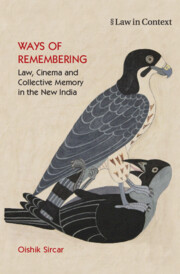Book contents
- Frontmatter
- Dedication
- Contents
- List of Figures
- Acknowledgements
- List of Abbreviations
- 1 Law and the Aesthetics of Atrocity
- 2 A Jurisprudential-Aesthetic Approach
- 3 The Best Bakery Judgments: Aesthetics of Judicial Memory
- 4 Bollywood’s Law: Cinematic Justice and Collective Memory
- 5 ‘As They Ought’
- Notes
- Glossary
- Bibliography
- Index
3 - The Best Bakery Judgments: Aesthetics of Judicial Memory
Published online by Cambridge University Press: 30 April 2024
- Frontmatter
- Dedication
- Contents
- List of Figures
- Acknowledgements
- List of Abbreviations
- 1 Law and the Aesthetics of Atrocity
- 2 A Jurisprudential-Aesthetic Approach
- 3 The Best Bakery Judgments: Aesthetics of Judicial Memory
- 4 Bollywood’s Law: Cinematic Justice and Collective Memory
- 5 ‘As They Ought’
- Notes
- Glossary
- Bibliography
- Index
Summary
The forms and methods by which a trial or decision is recorded, and remembered, are variegated and often in competition. How those different records or stories are revealed is the preliminary step in recognising that a decision explains more than doctrine.
[T]o read the genre of judgment as only legal is to miss the most important aspects of its operation. In particular, it is to miss the constitutive and performative dimension of law's contexts; contexts which are not decorative or ornamental, but rather provide the horizon and limit for the possibility of law's action.
Sensory images and symbolism convey meaning … not only in terms of the discourse of a particular trial … but, more generally, through the legal environment in which the trial takes place.
This chapter uses the J-A approach to read the memory of the pogrom that is recorded in the texts of the judgments of the Best Bakery trial, one of the most publicised and controversial cases arising out of the Gujarat pogrom. The Best Bakery case, as it has come to be popularly called, ran from 2003 to 2012, covering the whole hierarchy of the Indian criminal justice system. This chapter will focus specifically on four judgments: one by the sessions court in Vadodara, one by the Gujarat High Court in Ahmedabad and two by the Supreme Court of India in New Delhi.
While the reasoning and outcomes of the judgments differed across the courts, they were unanimous in their condemnation of the violence. My reading identifies a set of words as aesthetic tropes—‘rhetorical or figurative’ expressions that ‘are a feature of all [legal] discourses’5—which recur in the judgments. The use of these tropes valorises legalism, secularism and developmentalism as part of a particular state-making and state-preserving rationality.
I begin by providing a detailed re-description of the Best Bakery case and its judgments. The judges have organised the writing of all the judgments under two heads—judgment and reasons. I specifically attend to this organising structure of the texts to signpost the aesthetic tropes that each of the judgments deploys to build their narratives. I then use the J-A approach to read the texts of the judgments by paying particular attention to their forms of writing. These forms are categorised as record, image and mnemohistory.
- Type
- Chapter
- Information
- Ways of RememberingLaw, Cinema and Collective Memory in the New India, pp. 42 - 93Publisher: Cambridge University PressPrint publication year: 2024



